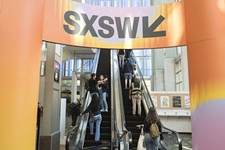Page Two
With few big surprises, the recent local election left us to ponder single-member districts, minority representation, and campaign spending. Also: the consequences of wristband counterfeiting, and The Chronicle Hour is no more.
By Louis Black, Fri., May 9, 2003

Warren Buffett argues that Bush's tax breaks are incredibly unfair, overwhelmingly favoring the rich. Only the most die-hard Republican loyalists argue that they'll have much effect on the economy, though that is how they're being sold. The vast governmental job-cutting sure to follow will have far-ranging impact: Every job lost has concentric economic consequences. The expected investment boost probably won't be much, and almost certainly not the adrenaline shot promised. Ironically, the president can have an impact by inspiring confidence. If Bush's simple-sentence, targeted-message optimism can inspire the American people in peace as it did to go to war, the mumbo jumbo might work -- consumer spending is crucial.
Locally, we haven't seen even this kind of witch-doctor leadership. While celebrating the music business and small businesses, the council passed the sound ordinance and is considering the anti-smoking one. There is no elected local leader who inspires much trust. City Manager Toby Futrell is Austin's saving grace, though she faces an impossible task.
Will Wynn's overwhelming victory is as much a comment on his opponents as an endorsement. Max Nofziger complained about not having enough money or press. Nofziger had as much name recognition as anyone in the election. Margot Clarke certainly didn't have the name recognition, and neither Wes Benedict nor Steven Adams had that or press support or money, yet all three out-polled him. It wasn't money or media. Nofziger ran on his record, and that took him out.
Brad Meltzer positioned himself as an outsider who would run the city as a business, but he campaigned just like a politician. He spent rather than studied, he relied on consultants, and slogans were more important than facts. The "businessman" candidate spent more than $20 for each vote he got.
The surprise about Marc Katz was not the number of votes he got but the weak campaign he ran. While raging against political blabber instead of common-sense actions, he offered rhetoric instead of specifics.
Wynn was not only the best choice among this crowd, but may prove to be exactly the mayor Austin needs right now. Crucial is going to be Wynn's ability to steer his own course and follow his own vision rather than be battered by the vicious political winds of this city's many differing political communities. The next three years offer no obvious solutions to the overwhelming number of problems. Wynn's strength is his understanding that bringing disparate voices together is the best way to move forward.
Post-election, Brewster McCracken asserted that with seven candidates he expected a run-off, though he spent like he was hoping to avoid one. Either McCracken (44% of the vote) or Margot Clarke (35%) would make good council members, though given the makeup of the current council, I reiterate our strong endorsement of Clarke. McCracken's post-election comments were just as slick as expected.
The races considered the most predictable proved the most interesting. In Place 2, incumbent Raul Alvarez got 55% of the vote, Gavino Fernandez 10%, and Steven Adams an astonishing 35%. In Place 6, incumbent Danny Thomas got 65%, and Wes Benedict an equally astonishing 35%. Given that Adams and Benedict spent almost no money and had little local presence, the meaning of this vote has to be contemplated. This was clearly a protest vote. Some argue it was anti-minority, others that it was anti-council. The vote again raises the issue of single-member districts, pointing out how pathetic and inadequate the so-called "gentlemen's agreement" seats are.
Why Alvarez spent $48,000 is a question that must be asked. Thomas spent only $4,600. Some may argue that the closeness of the race indicates Alvarez was just being cautious, but given expectations and Thomas' expenditures, I'm not buying. Alvarez outspent all but three candidates in the election, including more than a half-dozen contenders in races that were more clearly contested.
The ACC propositions passed, again to many people's surprise. Much of this was because of the ACC community's turnout and outreach. Ironically, anti-proposition activists may well have contributed to their own defeat by illustrating how small the potential increases were.
The villain of these elections was not the economy -- that's an accepted evil -- but campaign finance limits. Anti-democratic, incumbent-friendly, their direst consequences were clearly demonstrated in this election. As they will in the future, committed community leaders with proven campaign track records faced uphill electoral struggles while wealthier, self-financed candidates had smoother sailing. Let's get rid of campaign finance limits soon.
Rather than personalities, this election leaves us to ponder single-member districts, minority representation, and campaign finance -- all in light of the economic tidal wave sweeping over Austin. We wish Mayor Wynn and the council the best of luck.
Last Friday afternoon I took part in an Austin Police Department news conference, hosted by Cmdr. Howard Williams, on the arrest of four of five people suspected to be involved in counterfeiting SXSW wristbands. Materials sufficient to produce 4,500 wristbands had been ordered, and the police and SXSW staff confiscated hundreds of fakes, leading us to believe a substantial number were sold or distributed.
I pointed out how remarkable it is that SXSW is 17 years old, yet we have never had a major public-safety incident. The police, fire, EMS, housing, and other city public-safety departments have been proactive rather than reactive. Our first meeting with them was not when we discovered the counterfeits but weeks before SXSW, long before either the Chicago or Rhode Island tragedies. SXSW Managing Director Roland Swenson, our public-safety liaison Carlyne Majer, and I gathered in the office of Assistant City Manager Laura Huffman with fire inspectors, a police representative, and a housing inspector to discuss SXSW-related safety issues.
Once we alerted the police to the forgeries, they were extremely cooperative. Detective Andrew Perkel cracked the case, tracking down the alleged counterfeiters. The arrests came as a relief not only to SXSW but to music businesses across the city. Music is a tenuous business at best, and unscrupulous exploiters can cause more damage than they can possibly imagine.
Counterfeit wristbands, especially after the fire tragedies, had consequences. We carefully calculate badge and wristband distribution in terms of overall clubs' capacity. This screwed with those calculations in every way. People who legitimately purchased badges or wristbands had trouble getting into clubs, which already had decreased capacity. Possibly, some badge holders didn't get to see bands they hoped to (and the bands come to SXSW for that incredible combination of an extensive music-industry crowd with Austin's local, music-crazy audiences). Despite the ridiculously exaggerated SXSW grosses I've heard over the years, the operation plays it pretty close to the vest. No one in the organization is buying a second home; instead, over the last two years, management took a salary cut, positions have been eliminated, and people were laid off. Putting on a 10-day event involves a year-round staff of just under 30 people and enormous ongoing costs. A significant loss in revenue impacts on the lives of people who, day in and day out, work to promote Austin and its music to the world.
We discovered the extent of the counterfeits toward the end of the event. After months of 12- to 16-hour days, six- and seven-day weeks of planning, and the intensity of SXSW itself, you can't imagine how devastating it was. Fortunately, we contained it effectively, but we were dreading next year. We thank the city, the police, and especially Detective Perkel and Cmdr. Williams. Thanks also to our friend Roy Minton and his staff for helping out when we needed them.
The Chronicle Hour on 1370AM is no longer. Next week we'll tell you why. ![]()










